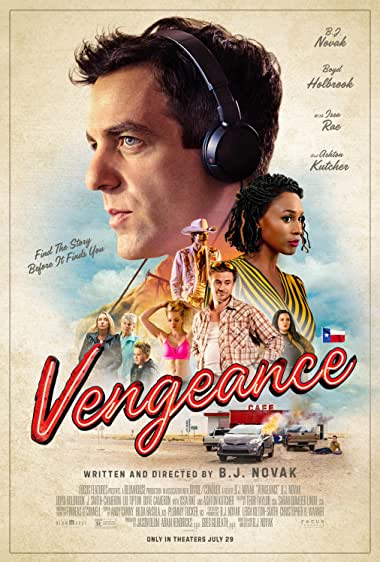"Frontier Justice"

| None | Light | Moderate | Heavy | |
|---|---|---|---|---|
| Language | ||||
| Violence | ||||
| Sex | ||||
| Nudity |
What You Need To Know:
VENGEANCE is a captivating, well-acted, sometimes profound mystery about two cultures clashing. spite some morally uplifting content, it leans toward a Romantic, Non-Christian worldview that ends with a bloody act of vengeance. VENGEANCE also has lots of strong foul language and some light politically correct elements. That said, VENGEANCE presents plenty of food for thought about the nature of justice, ethics and social divisions. Extreme caution is advised, however.
Content:
More Detail:
VENGEANCE is a mystery thriller about a shallow, condescending, ambitious New York City magazine writer who’s enticed by a man in West Texas to investigate the death of his sister from a mysterious drug overdose because the brother mistakenly thinks his sister was the writer’s girlfriend when she lived in New York. VENGEANCE is a captivating, well-acted, sometimes profound mystery about two cultures clashing, but it has lots of strong foul language, leans toward a Romantic, Non-Christian worldview, and ends with a bloody act of vengeance and murder which is, to a certain extent, depicted as justified.
B.J. Novak, who also wrote and directed VENGEANCE, stars as the New York magazine writer, Ben Manalowitz. Ben works for New Yorker magazine but plans to start his own podcast.
The movie opens with Ben at a fancy party where he’s discussing his dating life with another friend. Neither man is ready to settle down, so they are both playing the field. As their conversation continues, it becomes clear that both men are pretty shallow.
The next morning, after sleeping with one of the women he’s dating, Ben gets a call from Ty Shaw, the West Texas brother of a young woman Ben dated in New York, Abby. Ty is under the mistaken impression that Ben was Adele’s boyfriend. He tells Ben Abby was found dead of an overdose. He shames Ben into coming to Texas for Abby’s funeral.
After the funeral, Ty tells Ben that Abby would never have taken drugs. He wants Ben’s help in tracking down the person or person’s responsible for Abby’s death and help him kill them. Of course, Ben doesn’t want any part of that, but he agrees to help Ty find Abby’s killer. However, he thinks Abby’s story can be the first multi-part story on his upcoming podcast and he pitches the story to his podcast company’s editor as a sociological investigation of the factors behind Abby’s death. He starts interviewing people on tape and looking at some videos of Abby.
As Ben gets to know Abby, her family and the other people in her life, he decides Abby’s death might indeed have been murder or manslaughter. So, he switches his focus into finding the killer or killers, even though his decision may endanger his own life.
VENGEANCE is a captivating, well-acted, sometimes profound mystery about two cultures clashing. The hero finds out that the dead girl’s body was probably dumped, but it was dumped in a notorious isolated section of town where the jurisdictions of four local and state police organizations overlap. The hero goes to each organization, but the police authorities all pass the buck to each other. That’s why the victim’s brother tells the hero that the police are no help. This fact becomes key to what happens when the hero finally does find the person responsible for dumping the victim’s body and confronts the person. What the hero finds is a nihilistic killer who tells the hero that, even if they do put him on trial for the victim’s death, society will start blaming the victim, the legal authorities will have a hard time prosecuting their case, and people eventually will absolve him of full responsibility and even point the finger at the hero because they will think that the hero is also partly to blame because of his hookup lifestyle when he used the victim for sex when she lived in New York. Some of what the killer says is true, but he says it in such a smarmy, self-righteous way that the hero is rightfully outraged.
Ultimately, despite the hero’s moral awakening, VENGEANCE leans toward a Romantic worldview, because even the hero comes to see that factors in American society contributed to the young woman’s death. This has been a theme throughout many modern mystery thrillers, from short stories and books to movies and television programs. In many modern mystery thrillers, for example, human society has become so corrupted because the corruption of human beings has gotten out of control in many ways. In effect, everyone is now guilty. Ironically, this theme can point the creators of these mystery thrillers, and the consumers of such thrillers, back to the biblical notion that, as God tells himself in Genesis 8:21, “The intent of man’s heart is evil from his youth.”
However, VENGEANCE leans toward a Romantic worldview at the end, because it ends on a note of violent vengeance. In fact, the hero crosses the boundary into violent vengeance, a boundary that he told the victim’s brother he would never cross. So, while the hero does find some justice for the victim, he violates the rules of justice and vengeance that God sets down for us in His word, the Bible. This fits into the notions of lawlessness that a Romantic worldview can depict or generate. VENGEANCE also has lots of strong violence, some politically correct content, references to drugs, and a violent bloody shooting at the end.
That said, the negative content in VENGEANCE is mitigated by some solid moral elements. For example, although the hero has conflicts with the people in Texas, including the victim’s family, and vice versa, the movie sometimes shows the hero and the Texans reconciling some of their differences. For example, there are some heartwarming moments between the hero and the victim’s mother and younger brother. Also, one character displays some insight, kindness and compassion toward other people, including his business clients, for whom he’s trying to fulfill their dreams. So, VENGEANCE is not as cut and dried as it may seem. It presents plenty of food for thought about the nature of justice, ethics and social divisions. Extreme caution is still advised, however.



 - Content:
- Content: 



